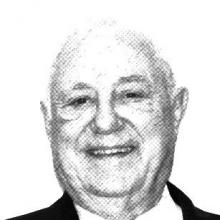You are here
Peace in Palestine?
Feb 21,2019 - Last updated at Feb 21,2019
I listened very intently and with great interest to a captivating lecture by Mohammad Barakah, former, five times elected, member of the Israeli Knesset, given recently before the guests and members of the Jordan Science and Culture Society. Even more impressive than the speaker’s poise and conviction was the fresh, frank and honest content of his presentation, very eloquently expressed in a smooth mixture of classical and colloquial Arabic.
A few weeks before this, his host, the Jordan Science and Culture Society, had sponsored a call on all political parties and factions among the l948 Arabs, Arab citizens of Palestine who hold Israeli citizenship, to unite prior to the Israeli Knesset elections scheduled for April 9; a move which in the previous elections was successful in increasing the number of Arab deputies in the Knesset. A cause for concern was the possible withdrawal of the respected deputy Ahmad Tibi from what is now known as the Arab Combined List, which might alienate Arab voters and lead to a decrease in their representation. Barakah was very explicit in joining our call, and assured us of his intention to continue to maintain his contacts and efforts with Tibi.
I was impressed not only with the frankness and honesty of the lecture, but with the discussion that followed and the keen awareness of his audience of the form and content of Israeli politics. Not once was the word “normalisation” even mentioned, and Israeli Zionist apartheid racism was discussed like a kind of dangerous disease that should be dealt with and eradicated. The whole discussion reminded me of the ongoing, futile discussions of the dangers of normalisation with Israel. This has also caused me to wonder that if Mohammad Barakah, born and educated in Israel and a graduate of Tel Aviv University, is still not “normalised”, then what does it take to be “normalised”? Obviously, it is Israel that has constantly refused to have any “normal” relations not only with its neighbours, but also with the Palestinians themselves, whose very land it occupies. Its July 2018 Jewish Nation-State Law, which emphasises the exclusivity of Zionist racism and renders its Arab citizens to the level of non-persons of second or third class status, makes this very clear.
Perhaps it was living under the harsh atmosphere of Israel, his education and daily contact with the realities of life that produced his realistic outlook on the Arab-Israeli conflict. Though he lamented and condemned certain Arab, under-the-table, contacts with Israel, he sees them as only another obstacle facing the Palestinians. Whatever may happen and whoever contacted whom, there is no way out of the conflict without an independent Palestinian state, with Jerusalem as its capital. As he puts it, “Today, there are on the land of Palestine six-and-a-half million Arabs and an equal number of Jews, and only time will tell how things will evolve.” He was proud and very appreciative of Jordan’s support of Palestine and the Palestinians in general, and especially proud of Jordan’s decisions allowing the l948 Palestinian students to study in Jordan and the faithful to join Hajj (the greater Muslim pilgrimage) to the holy places in Saudi Arabia. He was emphatic in his appreciation for the Jordanian Hashemite Custodianship of the Muslim and Christian holy places in Jerusalem, “without which, Al Aqsa is exposed”.
Palestine needs the unity of its people, and Barakah devoted some time to the division between the Palestinian Authority and Hamas. In answer to a question about that, he said “Ya akhi [my brother] we are humans, not angels... we agree and we do not agree sometimes, like all other human beings...”
The word human in his answer reminded me of the chronic and persistent inhumanity of the Likud and its leaders, past and present, who distort their own religion and the heart of Western civilisation, turning Israel into a heartless Nazi-like killing machine. And as I look to the upcoming Israeli elections of April, I still wonder what happened to the culture of the Jews, “People of the Book” and how Zionism came to give birth to such an apartheid culture that thrives on fear and to a premier who openly declares to his people that they “shall always live by the sword”. How did Zionism succeed in creating, in such a large segment of its people, a mindset impervious and impenetrable to logic, simple human empathy and instinct?
Contrasting Barakah to Bejamin Netenyahu, Benny Gantz, Naftali Bennett or Avigdor Lieberman, I wonder where they are leading their people and whether they ever left behind the raw and primitive instinct of survival: the call of the wild?
Barakah in Arabic means blessing and may God’s blessings be bestowed on those who seek peace, a cherished blessing in both Christianity and Islam.












